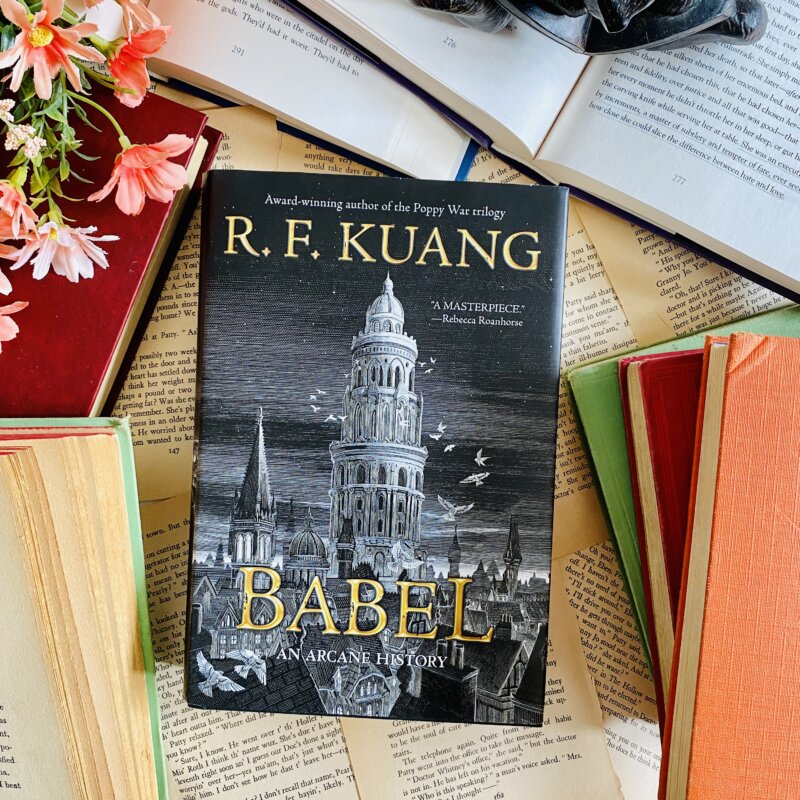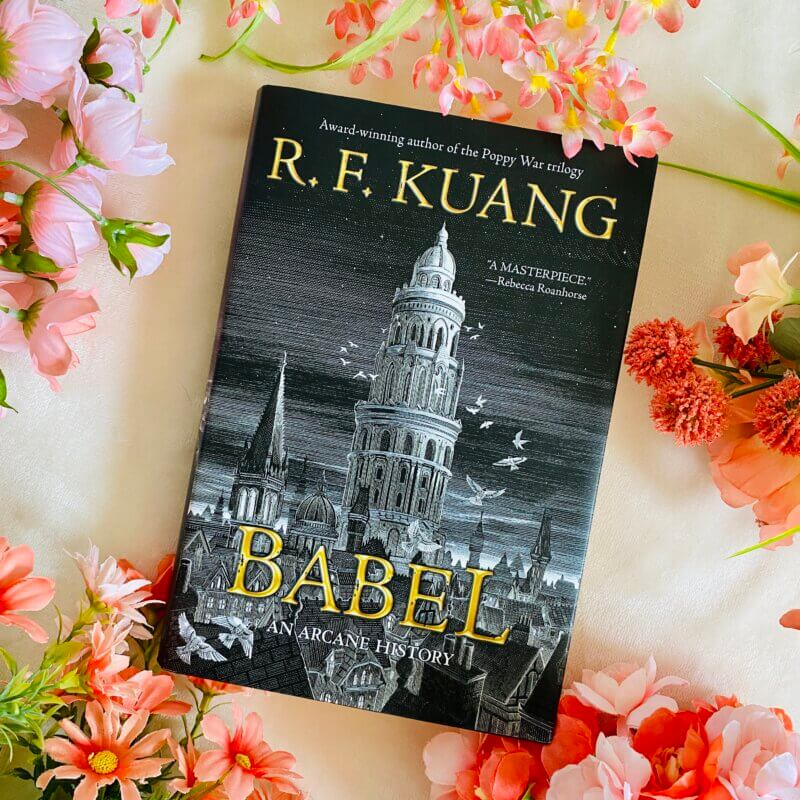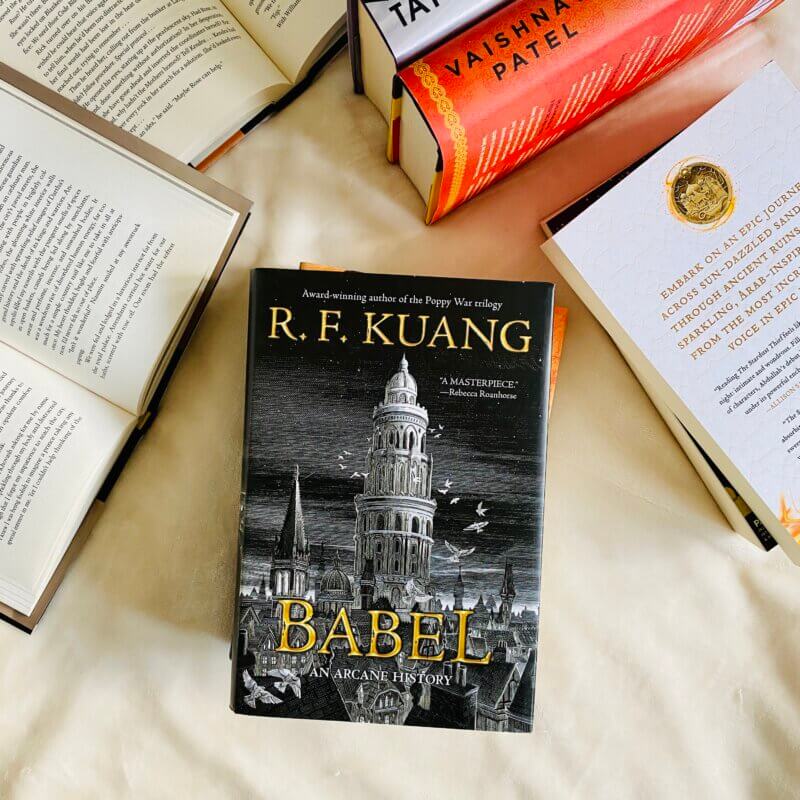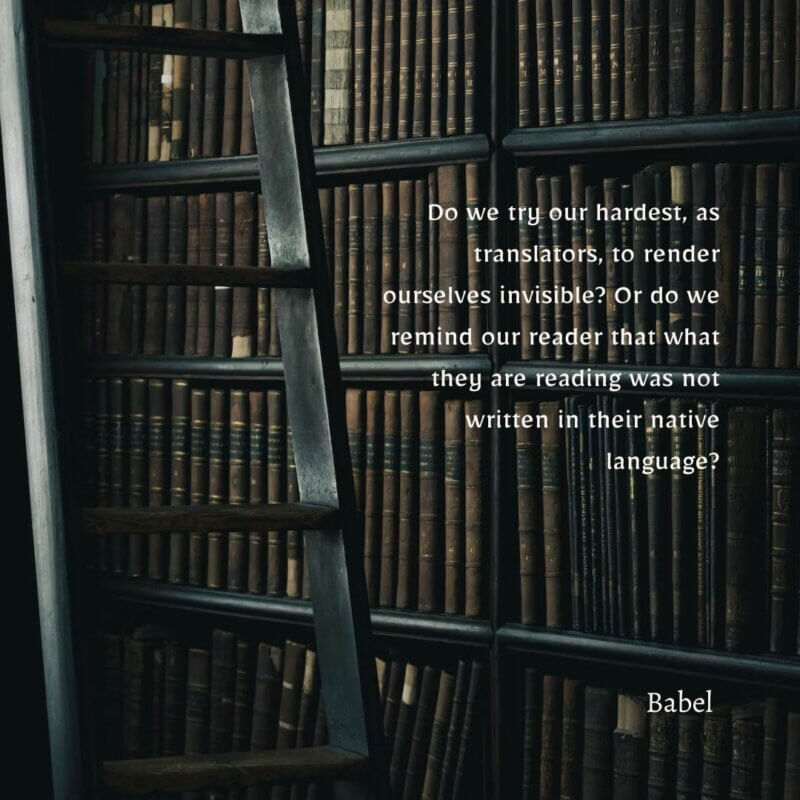Welcome friend! The day has finally arrived when I am sharing my thoughts on R.F. Kuang’s Babel: An Arcane History. This was a phenomenal read that I discussed with many friends. Through my notes, you will also Ariel’s thoughts. I looked for discussion questions for this book to enhance my understanding so you will find some of these dispersed through the review too. If you have read Babel, please join the discussion! If you haven’t, I hope you consider reading this book should it appeal to you. 🙂

Babel: An Arcane History
R.F. Kuang | Goodreads
From award-winning author R. F. Kuang comes Babel, a historical fantasy epic that grapples with student revolutions, colonial resistance, and the use of language and translation as the dominating tool of the British Empire
Traduttore, traditore: An act of translation is always an act of betrayal.
1828. Robin Swift, orphaned by cholera in Canton, is brought to London by the mysterious Professor Lovell. There, he trains for years in Latin, Ancient Greek, and Chinese, all in preparation for the day he’ll enroll in Oxford University’s prestigious Royal Institute of Translation—also known as Babel. The tower and its students are the world’s center for translation and, more importantly, magic. Silver-working—the art of manifesting the meaning lost in translation using enchanted silver bars—has made the British unparalleled in power, as the arcane craft serves the Empire’s quest for colonization.
For Robin, Oxford is a utopia dedicated to the pursuit of knowledge. But knowledge obeys power, and as a Chinese boy raised in Britain, Robin realizes serving Babel means betraying his motherland. As his studies progress, Robin finds himself caught between Babel and the shadowy Hermes Society, an organization dedicated to stopping imperial expansion. When Britain pursues an unjust war with China over silver and opium, Robin must decide . . .
Can powerful institutions be changed from within, or does revolution always require violence?
Content notes include Racism, Colonisation, Racial slurs, War, Slavery, Sexism.
Babel: An Arcane History – Review
Writing Style
Babel reads like an academic text. Told in third person, following Robin as the main character, there are a number of characters in this book who are built thoroughly. In addition to his storyline, there are also footnotes and interludes.
The footnotes add additional historical context, translations, pronunciations and details about the life of characters that are not the main focus in the book. Considering the truths that they uncovered, they had a purpose: to reveal the layers of propaganda in the empire. They had information that Robin was not privy to and hence could not integrate into his narrative. In the audiobook, they were narrated by a different voice and that helped make them distinct from the rest of the story.
Ariel: The footnotes gave the story an extra “academia” feel. In my own academic journey, I appreciated how footnotes provided that space to say “there’s a lot going on here and I don’t want to take away from the main point here, but this is worth mentioning” and it provides avenues for readers to think more critically about the information being presented.
Through the interludes, I liked learning about the dreams of Ramy, Victorie and Letty – who they imagined they could be and how their circumstances limited and shaped them. Letty and Victorie’s treatment as women, Ramy’s invisibility in many places and Robin passing off as white added dynamics to the group. They knew they didn’t have a choice in how the society viewed them and they learned to use this to their advantage. But years of oppression in this manner was ultimately going to reveal the scars that it caused.
Ariel: There is incredible nuance that overlaps the four main characters, and I thought that the author captured that quite well. There’s overlapping areas of privilege and oppression, and many times it’s shown how white patriarchal supremacy uses those overlaps of privilege (being lighter skinned or being a man, as two examples) to try to position those not in power against each other in order to preserve the status quo.
Babel is divided into five books. Book 3 has some unforgettable scenes and the best of masterful writing: Robin waiting for one of the Babel professors after being detained, Ramy’s insight into Robin’s actions, Robin’s confrontation with Professor Lovell towards the end of this part.
What will it take for the people to rise up against injustice? Will a secret society’s attempts to correct wrongs be enough to bring the wave of change that the world needs? How do you rally one country’s people for another? These are just some of the grand questions that Babel answers through its characters and setting in the last two books.
World building
Babel sets out to do a lot. It questions the status-quote while succinctly portraying the dawning of understanding in Robin about his origins, Lovell’s experiment to bring him up, the way his language and people are being exploited and the role Babel plays in the existence of the empire and continued oppression of the people. Through Letty, Babel highlights how people, coming from a place of privilege, cannot relate to the struggle that fellow scholars of foreign origin – Robin, Ramy and Victoire – face, even after developing an intimate friendship with them. Through certain events in the book, Babel’s world slowly expands from the institute to China and political negotiations.
Babel is grounded well in our own history too. Industrial revolution, morse code, invention of photography, the opium monopoly, the increasing control of the British in Asia through the East India Trading company, the proliferation of English in the colonies… All of these transpired. The integration of silverwork to speed up some of the events was shrewd and brilliant.
Ariel: I found the historical fiction fantasy setting to be very accessible without much of a learning curve. Since everything takes place in a real-life historic setting with some magical elements, there isn’t time spent on building a unique and original world. Instead, the author’s point and narrative of critically challenging the status quo and highlighting injustices of oppression remains at the forefront without distraction.
Question: How did you feel about the interludes? How do you think they served the story? Did you find yourself wanting interludes from other characters? If so, who?
Ariel: I often find that I prefer multiple points of view in fantasy books, especially ones seeking to capture the nuance of experience and worldview. In our glimpses of other points of view, we see the overlaps and differences between the different characters and their journeys and what drives them to make the choices they do.
Kriti: The interludes were helpful in giving insight to Ramy, Letty and Victoire. They have their unique origins stories which explain their motivations in a way that Robin’s narrative would not have done justice. All three of them are strong characters that deserve a voice and I liked hearing from them.The writing in Babel is superb and the timing of these interludes could not have been more spot on. Griffin is probably the only other character whose interlude would have been interesting but considering how much Robin comes to understand the life Griffin had, I got a lot of Griffin through Robin’s narrative and the footnotes.

The Characters in Babel
Robin
Robin is given a ‘home’ by Professor Lovell when his family dies of cholera in Canton, China. As a young boy, he journeys to Britain and immerses himself in books and education. He does not have a choice in what he studies. Lovell has a strict curriculum in languages with a vision for Robin to join Babel, the institute of translation in Oxford. Lovell decides which languages Robin pursues and which one he has to let go of. Robin is too young at that time to question Lovell’s motivations. He settles into a life of languages and books in an unemotional and unsympathetic mansion. Even as a young boy, he knows that the people of his country are looked at a certain way and on the voyage from home to Britain, Robin is already making choices of self-preservation. As a child who saw all of his family die, he prioritises survival and this becomes a defining trait of him as the story progresses.
Robin’s upbringing with Lovell continues to highlight his otherness. He did not realize the weight of the contract that he signed as a young boy and how he would end up being a pawn. When Robin finally moves out and starts his formal education at Babel, he meets Ramy, an Indian boy who had a similar living situation as him with another Englishman. For the first time in his life, he is able to be open with someone, share his heartbreaks. Ramy and Robin belong to a cohort of four students that year. They become fast friends with Letty and Victoire. There is a camaraderie in their friendship that none have experienced before.
I related to Robin as an immigrant. His first glimpse of the motherland after being away from it for almost a decade reminded me of my own hopes and fears when I returned to India for the first time after a year in Canada. Pg 254
Griffin
In his first days at Babel, Robin also encounters Griffin, a man who looks like him and belongs to a secret society trying to put silver in the hands of those who need it. Griffin opens Robin’s eyes to the underlying corruption and selfishness of the British empire and how the institute of Babel supports it. It takes Robin time and experiences to understand the big picture of which he is a small part but through Ramy and Victorie, he again finds understanding and support.
As Robin and Griffin get to know each other, they see how Professor Lovell used them. The importance of education is drilled into both of them since being adopted as wards by the professor. This has a strong impact on their actions, self-esteem and self-belief. Lovell is not a kind person. He is manipulative and sees everything as an experiment to be tried again for better results. Language affinity is key for a foreigner to be of any use to Lovell and he picks his wards accordingly, adjusting based on past outcomes and future endeavours.
Robin is constantly faced by a tug of war between the morals that Griffin holds highly and wants him to accept, and his own place in the world. In Babel, he stands out, is accepted and seen like he never was before. He is thriving as a scholar and as he steps more into the real world, meets people, travels, his eyes open to corruption, injustice and the big picture. He is an imperfect human being like everyone else and it takes him some years to figure out where his loyalties lie.
Throughout the book, there is an interwoven narrative about Robin’s upbringing and Professor Lovell as a cut-throat scholar, translator, prominent figure in the empire and guardian. There is only one person he ever gets emotional about and that speaks to the educational excellence he admires above all things. The storyline related to Eveline Brooke, her connection to Griffin, the denial of her death in the faculty and the truth that binds the past to the present is done beautifully in Babel.
Ramy, Victorie and Letty
While I always found Victorie fascinating from the moment of her introduction, she showed up as a strong character starting book 3. Her lingual expertise is rare in Babel and similar to Ramy, she voices her opinions on the work she wants to do and the work the professors want her to do. The tug of war between how she wants to use translation and the way the empire will use her knowledge is evident.
Ramy is hands down a favorite and our shared roots made him dear to me. Just in the first few days, he teaches Robin many truths. I admire his stance on how he shows up and the finesse with which he carries himself. He is Robin’s first and true friend, influencing him in ways Robin never imagined. Pg 54
I understood Letty’s struggles as a British woman. She wanted to support her friends but similar to Robin, she puts survival before anything else. Her character has more nuance but there isn’t time in the last half of the book to make her see where the others are coming from. Personally, I do not know how to make her understand and I did not see Babel offering any solution. I expressed my thoughts to Ariel and found her words very helpful.
Ariel: Each of the characters, from the main characters to the minor side characters, are given a choice in what to do in the climactic conflict. There is an opportunity to directly face and challenge the oppressive systems and each character chose what made more sense to them. Some wholeheartedly wanted to see everyone burn with no thoughts on the repercussions, some wanted a more mild option, some wanted a nonviolent option, and some felt that this choice was ridiculous and could only see the “positives” of the Empire. But, when push came to shove, neutrality was no longer an option for the characters and they had to make that choice for themselves.

Education in Babel
Education at Babel was fascinating to read about. The theory behind translation was well done and I enjoyed all the classes that Robin, Ramy, Victorie and Letty undertook. The questions posed by the professors, the field missions the students went on, the projects they pursued and the contribution they were expected to make with their lingual expertise gave Babel the erudite and centre of learning feel it deserved. The magical element of silverworking through translating is interwoven beautifully in the book.
As Robin and his cohort progressed through Babel’s vigorous education, they were mandated to learn silverworking, another language, history of words and their meaning in different languages. The exams were stressful and the public humiliation of being kicked out of Babel, the place that had become everything to them, showed in their struggles. As they struggled to excel, they also tried to balance the dark truths lurking underneath the academic system – how the translated texts were used to create treaties and agreements with other countries, how very few true translations actually existed, many works having been translated to German and then English rather than directly from original language to English. The translation institute may have been standing for years, but the access to foreign lands and languages, fluent speakers in particular, is more recent and Robin’s cohort was an outlier in the variety of languages Robin.
I loved the academic side of Babel. I enjoyed the lessons in etymology and as I do my own translation work, or try to understand my relationship with words like ‘flaw’, I have started to go back to their etymological roots. Silverwork is a political weapon with magic which has a strong presence throughout the book. The cohort’s awe to work with it and how it tests their grasp of language and magic is an element unique to Babel and I absolutely adored it. Through Griffin and the Hermes society, Robin is forced to confront questions like the empire hoarding all the silverwork and its use as an instrument for war. I loved that silverwork was used as a catalyst for the industrial revolution. Babel does a fantastic job of integrating historical events with magic.
As the cohort started their field work and undertook a journey to China for help in trade negotiations, they got a glimpse of the life they would lead after their studies at Babel concluded. In many ways, this comes as a shock, particularly to Robin who is confronted with the question of who he really is. China is his motherland and he has always seen himself as a Chinaman but he finds this sentiment is not shared by the British in China. They see the Chinese as backward people. The British want to continue to exercise their rights and liberties that they enjoy back home as Britishers on other countries’ lands and when the Chinese officials point out the ridiculousness of this expectation, that is only seen as more proof of the Chinese being unworthy of governing themselves. The narrative that encourages and supports colonization, the idea that a nation is superior and should ‘help backward nations’ develop is portrayed with brutal honesty in Babel. It opens Robin’s eyes to the big picture he was unable to see in Oxford. He starts to understand Griffin better.
What Babel offered on Translation
Babel does an outstanding job of elaborating on the art of translation. My mother tongue is Hindi and since moving to Canada, I haven’t spent much time writing or reading in it. Babel got me to pick up Hindi again. I started with copying short quotes I found on Pinterest into my journal and then translating them. As my comfort level grows, I am starting to translate from English to Hindi and also writing my own sentences in Hindi. There is a lot to learn and relearn. I used to have a particular style of writing the alphabets and I have to rediscover that.
I also thought about Amma, my paternal grandmother, who was a professional translator of books in Hindi and her native tongue, Bengali. She was the only one who ever wrote me letters in Hindi and I am looking forward to finding her words again. As I try my hand at translating single sentences, I wonder about the bigger choices she would have faced in translating full novels. Here is an example of an English to Hindi translation and the nuances of word choice.
Spirit Daughter on Instagram once posted: “your next version is saying yes to you. It is time to say yes to her.”
- Who is ‘you’? What kind of terms am I on with them? Would I assume a formal stance or a more casual intimate relationship? The question will change the word choice in Hindi as similar to French where you may be translated as tu or vous.
- Moving to ‘version’. There is a direct translation in Hindi for that but there is also the concept of reincarnation in Hinduism and it makes more sense to me to refer to a reincarnation than a version. While reincarnations are related to rebirth, in my translation I want to portray the spirit of ongoing reincarnation in our lives.
- ‘Saying yes’ offers another crossroad. I could be true to it as it is or I could change it to ‘calling’.
Professor Playfair in Babel tells his class, “Do we try our hardest, as translators, to render ourselves invisible? Or do we remind our reader that what they are reading was not written in their native language?”

In this case, a machine (I had Google translate the sentence) will do a word to word translation. It feels awkward. It has words I would never use in everyday Hindi. As someone who knows the language and the culture (I believe both are important to get at the meaning to what is being said) that I am translating to, I have the liberty to translate into something that is more natural to Hindi, hence, hiding that the original is in another language. But isn’t it me who has derived that meaning?
Well I have said ample. I look forward to returning to Babel again. Add it to your Goodreads and let me know what you think of the book, and this review.
Many thanks to the publisher for a copy of the book for an honest review.

Be First to Comment